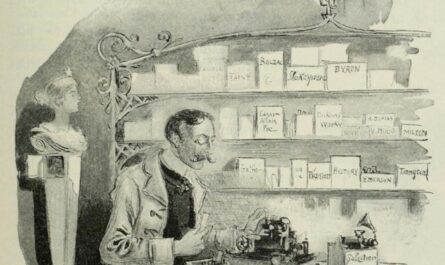The Great Ideas are those topics which have underpinned Western civilization from the beginning. They encompass our values and denote what we strive to realize and achieve. They represent enduring questions, such as: “What is good?”, “What is the nature of humanity?”, or “How can we know what is true?”. Timeless concepts like equality, perception, the conflict between good and evil, and quantity vs. quality have all been discussed, debated, and written about by some of the brightest minds humanity has known. Our modern society is desensitized to the Great Ideas because our entire civilization is founded upon them and we take them for granted, not because these ideas are irrelevant. They are all around us; they are, as David Foster Wallace said, the water in which we swim. By studying these centuries-old ideas we can understand how we arrived at our current moment, and how the conversation around them influences our daily lives and choices.
The Great Ideas Built the Western World
To study the Great Ideas is to investigate the foundations on which Western society is built. We spend much time on this website discussing the importance of developing a long view of history; cultivating the ability to look at a specific topic, understand the events leading up to the current conversation around it, and armed with such knowledge, make an informed decision moving forward. When we understand where an idea originated, we can investigate the ways in which it has been applied, and trace the impact it has had. Understanding how universal ideas have been studied in the past helps us to choose how to address them today. Take, for example, the concept of government. Over the centuries, it has developed from a tribal construct, to authority vested within divinely ordained monarchies, to rule by the elites, to today’s egalitarian, democratic societies. Simply knowing we don’t currently agree with monarchies or aristocracies falls short of possessing a full understanding – we need to grasp how those choices were acceptable at the time, and ensure we don’t repeat past mistakes.
To have a long view of history is to see ideas dance across the wide stage of human history. It requires intellectual humility as you learn more about a topic and refine your understanding. C.S. Lewis wrote that each age has its own blind spots and truths taken for granted. Like a time stamp, these mistakes and peculiarities differ with the decades, but the works from each age retain their own unique perspective. By reading books from different time periods, you become aware not only of that period’s blind spots and shortcomings, but position yourself to see the shortcomings of our current age, as well. The Great Ideas are drawn from books written across 2,500 years, providing ample opportunity to spot the oddities of each period.
A word on detractors
The Great Ideas are extracted from classical literature, and specifically from the Great Books of the Western World. The Great Books are not meant to signal a monopoly on truth, quality, or thought. They are simply the most concise and rigorous tomes representing the Western perspective over the past two thousand years. Again, to understand or hope to answer today’s problems, we need to know how we arrived at them. Today, it’s increasingly en vogue to reject ideas, works, or books simply because they were written decades ago. This is lazy and inarticulate reasoning. Instead, seeing a collection of ideas endure for centuries, across various nations, traditions, societies, and ethnicities would suggest there is some ageless element of quality to be found within those ideas.
Perhaps, before dismissing older tomes and ideas on the basis of age alone, these critics might consider the themes and ideas discussed in “old” books. Just as Chesterton cautioned to verify the purpose of a fence before tearing it down, one would be prudent to consider the ideas contained in old books before dismissing them in an ageist fashion. Ironically, many of the ideas being advanced today are in fact re-structuring of old ideas. Discussions of equality, justice, democracy, and truth are as old as civilization and the authors of the past would shed light on our current predicaments if allowed the opportunity.
A similar line of thinking posits that humans have evolved so far beyond previous societies and generations, such contributions from the past are no longer useful. Of course, we haven’t evolved all that much in just two thousand years. We simply have improved technologies, and a stronger understanding of medicine, enabling us to live longer. We continue to wrestle with the same questions around the law, we still strive to call out the good from the bad, we still don’t fully appreciate leisure, and we are regularly seeking the wisest methods of realizing our happiest and most fulfilled lives. We are very much in the throes of debates around objective reality, the nature of truth, and distilling fact from fiction. The Great Ideas are just as relevant today as they were when they were written by people struggling to improve the societies in which they lived. Wisdom has no shelf life.
The aim of this essay is not to advocate the Great Ideas or the Great Books as the only books capable of imparting wisdom. Nor should they be the only titles one reads. I obviously read a mix of old and new, fiction and non-fiction and likewise advocate a diverse reading diet for everyone. Rather, my position is that the Great Ideas contained in classics should not be dismissed simply because they are old. The conversation found in the Great Ideas represents and contemplates what it means to be human – at all times and across temporal divides. They are classics because they speak to and affirm the dignity of humanity.
What are the Great Ideas?
The Great Books encompass the heights of human contemplation and intellect. As such, they don’t often change. The purpose in distinguishing these titles is to have a select group of texts which the average person could study and emerge from with an understanding of how humanity views itself, the progress we’ve made over the centuries, and various perspectives on how those ideas can create change in the future.
The development of the Great Ideas reading list begins with John Erskine, a professor of literature and poetry at Columbia University in the early 20th century. Erskine was convinced the Great Books could and should be studied by the average person, not reserved for those with extensive training. He encouraged readers to read books from the past, so they could shape the future. He was concerned reading only contemporary titles would skew and limit their view of the world. His General Honors course was based on reading and discussing fifty-two of the Great Books across two years of study. In this course, Erskine wrote, “We read a book a week, and spent all Wednesday evening talking about it. How often was I told by angry colleagues that a great book couldn’t be read in a week, not intelligently! And how often have I retorted, with my own degree of heat, that when the Great Books were first published, they were popular, which was the first step toward their permanent fame, and the public who first liked them read them quickly, perhaps overnight, without waiting to hear scholarly lectures about them. I wanted the boys to read Great Books, the best sellers of ancient times, as spontaneously and humanly as they would read current best sellers, and having read the books, I wanted them to form their opinions at once in a free-for-all discussion.”
Erskine didn’t intend his methods to be the only method of teaching, nor for his selections to be an exhaustive list of great books in the Western world. He wanted to facilitate a discussion and encourage more people to be familiar with these great tomes. Nonetheless, his list was widely influential, and would inform the Great Books program at St. John’s College*, begun in 1937 and continuing today. His course would widely influence university humanities requirements across the nation. One of Erskine’s most note-worthy students during the 1920s was Mortimer Adler.
Adler received his Ph.D. from Columbia in 1928, then began teaching philosophy at the University of Chicago in 1930. While there he met fellow classical enthusiast Robert M. Hutchins, and the two developed and taught a curriculum based on the Great Books. The contrarian inventor Peter Thiel famously asks job candidates, “What important truth do very few people agree with you on?” Adler’s important truth, and the driving force in his professional life, was that the Great Books can and should be read and digested by the average person. As a result of his conviction, Adler, like Erskine before him, structured his philosophy course around reading and discussion. Instead of writing or examinations, the course depended entirely on the students doing the assigned reading, then participating in class discussions on the ideas discovered.
Adler remained at the University until 1952, when he resigned to become the associate editor of Encyclopedia Britannica, joining Hutchins, who was editor in chief. This allowed Adler survey thousands of titles – classic and contemporary – to produce a list of Great Ideas, compiled into what he published in 1952 as the “Syntopicon,” a two-volume supplement to that year’s Encyclopedia Britannica volumes. This “syntopicon” contains some three thousand ideas, from more than seventy authors, organized into one hundred two categories. The categories include concepts like independence, government, beauty, the soul, good and evil, reason, and perception. Along with religion, the one and the many, theology, angels, animals, infinity, the mind, prudence, and the will, they compose just a sample of the categories listed. These Great Ideas are not limited to any single school of thought or creed, and represent the very core of human thought and exploration.
Study the Great Ideas because They are the Foundation of Education and Entertainment
The Great Ideas represent the heights of human inquiry. They represent the endeavors of the past two thousand years undertaken by brilliant minds to more fully understand humanity, civilization, experience, and the world around us. As such, they are not limited to a specific place or era; they transcend space and time because they explore what is true of humanity. Nor are they limited to those with advanced training.
Perhaps the most compelling reason to study the Great Ideas is the simple fact we are awash in them. Our private lives involve habits, equality, love, justice, family, and happiness. Our entertainment discusses and examines the Great Ideas. For example, prestige dramas like Succession and True Detective look at good and evil, equality, truth, family, and progress. Game of Thrones discussed issues around the state, principles, prophecy, tyranny, and wisdom. The Marvel films discuss change, punishment, emotion, evolution, courage, the cosmos, duty, and God. We simply move and breathe among these ideas daily.
The Great Ideas remain great because they bring color and perspective to the human experience. Robert M. Hutchins wrote, “The spirit of Western civilization is the spirit of inquiry.” The spirit of inquiry embodies not only Western civilization, but the entire purpose of education – to inquire, to reason, to test, and to uncover the best answers to our enduring questions. To ask questions is to step out in pursuit of progress. When individuals stop asking questions, they cease to learn. It is the same with societies – when we stop asking questions, progress ceases. When we settle for what is here today and stop exploring the limits of our understanding, we settle for ignorance.
*Footnote: St. John’s College is a liberal arts college with an undergraduate program based largely on Erskine’s Great Books. The Great Books program there was started in 1937 and has remained largely the same, with titles compiled from Adler’s list which appeared in his How to Read a Book (1940), his Encyclopedia Britannica’s Great Books of the Western World, and from Harvard president Charles Eliot’s Five Foot Bookshelf titles.
Photo by Robert Anasch on Unsplash




